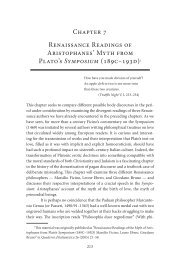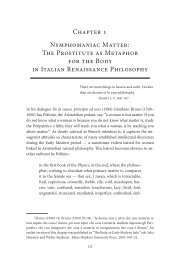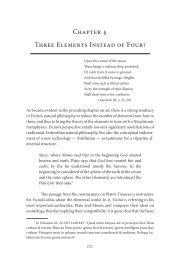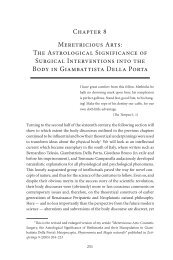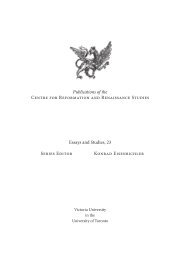Chapter 2 Matter as a Mirror: Marsilio Ficino and Renaissance ...
Chapter 2 Matter as a Mirror: Marsilio Ficino and Renaissance ...
Chapter 2 Matter as a Mirror: Marsilio Ficino and Renaissance ...
You also want an ePaper? Increase the reach of your titles
YUMPU automatically turns print PDFs into web optimized ePapers that Google loves.
The Descent of Soul: Narcissus<br />
<strong>Matter</strong> <strong>as</strong> a <strong>Mirror</strong> 65<br />
Accordingly, <strong>Ficino</strong> links this deviant movement of the soul towards deceptive<br />
images in bodies to the myth of Narcissus. This myth will turn out to be<br />
crucial for an underst<strong>and</strong>ing of the role of matter in <strong>Ficino</strong>’s metaphysics <strong>as</strong><br />
well <strong>as</strong> in his cosmology.<br />
Hence the tragic fate of Narcissus, which Orpheus records.<br />
Hence the pitiable calamity of men. Narcissus, who is<br />
obviously young, that is, the soul of r<strong>as</strong>h <strong>and</strong> inexperienced<br />
man. Does not look at his own face, that is, does not notice its<br />
own substance <strong>and</strong> character at all. But admires the reflection<br />
of it in the water <strong>and</strong> tries to embrace that; that is, the soul<br />
admires in the body, which is unstable <strong>and</strong> in flux, like water,<br />
a beauty which is the shadow of the soul itself. He ab<strong>and</strong>ons<br />
his own beauty, but he never reaches the reflection. That is,<br />
the soul, in pursuing the body, neglects itself but finds no<br />
gratification in its use of the body. For it does not really desire<br />
the body itself; rather seduced, like Narcissus, by corporeal<br />
beauty, which is an image of its own beauty, it desires its own<br />
beauty. And since it never notices the fact that, while it is<br />
desiring one thing, it is pursuing another, it never satisfies<br />
its desire. For this re<strong>as</strong>on, melted into tears, he is destroyed;<br />
that is, when soul is located outside itself, in this way, <strong>and</strong> h<strong>as</strong><br />
sunken into the body, it is racked by terrible p<strong>as</strong>sions <strong>and</strong>,<br />
stained by the filths of the body, it dies, <strong>as</strong> it were, since it<br />
now seems to be a body rather than a soul. 62<br />
62 Trans. Jayne (1985) 140–142; De amore, VI, 17: 235: “Hinc crudelissimum illud<br />
apud Orpheum Narcissi fatum. Hinc hominum miser<strong>and</strong>a calamit<strong>as</strong>. Narcissus quidem<br />
adolescens, id est, temerarii et imperiti hominis animus. Sui vultum non <strong>as</strong>picit, propriam<br />
sui substantiam et virtutem nequaquam animadvertit. Sed eius umbram in aqua<br />
prosequitur et amplecti conatur, id est, pulchritudinem in fragili corpore et instar aquae<br />
fluenti, quae ipsius animi umbra est, ammiratur. Suam quidem figuram deserit. Umbram<br />
numquam <strong>as</strong>sequitur. Quoniam animus corpus sect<strong>and</strong>o se negligit et usu corporis non<br />
impletur. Non enim ipsum revera appetit corpus sed sui ipsius spetiem a corporali forma,<br />
que spetiei suae imago est, illectus, quemadmodum Narcissus, affectat. Cumque id<br />
minime advertat, dum aliud quidem cupit, aliud sequitur, desiderium suum explere non<br />
potest. Ideo in lacrim<strong>as</strong> resolutus consumitur, id est, animus ita extra se positus et delap-



